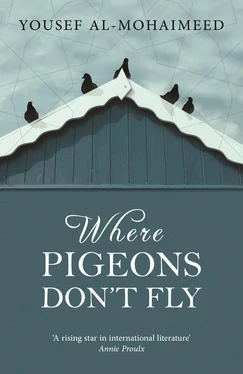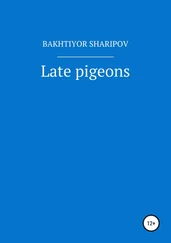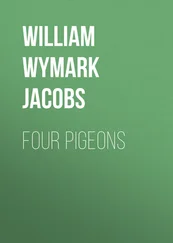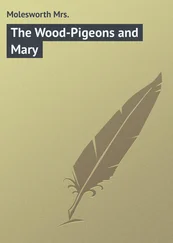Fahd was like a five-year-old who had become separated from his mother at a wedding, looking about in bewilderment and listening to his uncle make phone calls as he tried to get hold of a judge he knew to make their retraction official. Saeed whispered in his ear, ‘Why are you backing down so easily?’
Looking lost Fahd replied, ‘The point is to bury the dead and honour them. At least I’ll clear my conscience after neglecting her in her last days.’
Saeed raised his voice. ‘But now you’re neglecting her even more. You’re giving up the right to take revenge on her killers.’
His hands raised in grief and helplessness, Fahd grew agitated. ‘Saeed, I’m suffering enough. My conscience is eating me alive.’
Taking his hand, Saeed led him like a blind man to the hospital mosque next to the garden and removing his sandals guided him up the three steps.
‘Pray for guidance!’ he advised and went into the garden, lighting a cigarette as Fahd found a place in the far corner of the mosque beneath the tall glass window.
There was no one there except a cleaner in his yellow boiler suit, who sat at the front facing the mihrab absorbed in the Qur’an between his hands while Fahd prolonged his prostration, praying and invoking God. He got to his feet, eyes closed in humility and contentment and as he bent to perform the rakaa he saw a tiny, soft white pigeon feather on the edge of his thaub . He held his position, weighing up the life that was embodied by the feather. He didn’t know what he had recited as he prayed; had he performed two rakaas or three? He sat down and asking God’s forgiveness he plucked the feather from his thaub , moving it slowly over his faint moustache and imagining the vile pigeon from which it had fallen. He imagined the feather grumbling, muttering and rambling as it slumbered lonely and miserable on the mosque’s red carpet.
— 53 —
IN FRONT OF A large palace in the Ghadeer neighbourhood of North Riyadh, the white Land Cruiser stopped and four men got out. First came Abu Ayoub, who hurriedly unfolded his bundled mashlah , then threw it on his back, fastening the embroidered collar about his neck so that the garment hung down over his shoulders. He was followed by the other three — Ibrahim, Fahd and Yasser — and they were admitted by an Indonesian guard with a long beard like a billy goat.
The palace gardens were breathtaking, causing Fahd to look about in wonder, lost in contemplation of the large rose bushes that bordered the lawns’ vast expanse. They waited in the majlis where an ancient Eritrean circled with cups of coffee.
Like a man signing a death warrant, Fahd took hold of the pen and began slicing over the page as if cutting into his mother’s heart, his uncle and himself signing their consent to withdraw the case against the Egyptian sheikh, Mohammed Abdel Muati. Ibrahim kissed his head as the judge spoke of the importance of Qur’anic healing and the legality of beating, though not without an understanding of the limits proscribed by Islamic law. He made reference to tolerance and forgiveness in religion and prayed that the deceased might receive the mercy of God and His forgiveness, that her torment and suffering in this life might be accepted coin for her sins. Following every prayer, Yasser responded ‘Amen’ with simulated sorrow, sobbing and dabbing his eyes with the edge of his shimagh while with his left palm he hastily wiped his leaking nose.
Fahd recalled an absurd incident reported by the newspapers in which the relatives had relinquished their rights following the death of their son.
Family of traditional healing victim in Jeddah withdraw case; Healer freed on bail
Watan, 29 August 2006
Police sources have revealed that the family of a sick man treated by a traditional healer in Jeddah’s Rehab neighbourhood, who passed away two days ago in the evening, have submitted their waiver of rights to the circuit judge of the Bureau of Investigation and Public Prosecution to be legally ratified by the Jeddah courts.
The healer, who has been released on condition he make himself available for further questioning, told police that the man he was given to heal had been possessed by jinn since a young age. He claimed the victim had been possessed by three female jinn , giving the names of two as Mabrouka and Habeesa.
Yesterday, the North Jeddah Police transferred the case against traditional healer T.H.A. (45 years), accused of the manslaughter of patient M.A.A. (27 years) from the city of Qalwa in the Makhwa District, Baha Province, to the circuit court of the Bureau of Investigation and Public Prosecution.
The healer is charged with blowing into the victim’s mouth, causing his teeth to enter his throat, blocking the airway and suffocating him. The case was overseen by the Chief of the Jeddah Police, Major Saad Bin Daajam.
The incident had been promptly reported by the Head of Investigations in North Jeddah, Major Mohammed al-Khodari, and the Chief of the North Jeddah Police, Colonel Mohammed al-Malaki. Islamic Law specialists have criticised a number of traditional Qur’anic healers for undertaking cures without a proper understanding of the correct procedures.
Sheikh Radwan al-Radwan, Imam of the Ikhlas Mosque in Jeddah, has emphasised the need to give more powers to the committee made up of the Mayor’s Office and the Ministry of Islamic Affairs, Religious Endowments, Proselytising and Guidance, to enable it to pursue illegal acts resulting from such circumstances.
Al-Radwan added that the profession of traditional healing has become debased, stating that he had personal knowledge of incompetent healers who had been granted licenses to practice. He remarked that when the Qur’an is recited over a victim of possession the jinn will speak on the victim’s behalf, which can have a deleterious effect on the healer. He went on to criticise certain healers for hiring female secretaries and specialising in treating women in contravention of Islamic law and called on all traditional healing to be overseen and ratified by scholars competent in the field.
— 54 —
THAT NIGHT FAHD VISITED Lulua, and in the dining room overlooking the street he placed his head between his hands like a man coming round after a near-fatal car crash. Lulua stood before him and consoled him, stroking his hair, lighting the stove to make him a cup of tea and telling him to give thanks to God: their mother had been a believer, she had loved Fahd dearly and he had been a devoted son in turn.
Fahd recalled his mother’s enjoyment when he would lay his head in her embrace while she made a show of searching for some louse lost in the wild jungle of his hair. Everything on the top floor carries your memory: your small bedroom facing east, your prayer mat, the blue prayer robe you bulked out when you prayed, the large Japanese radio, the seven-columned oil-fired radiator by your bed, the oil pan atop it and the small bottles of mineral water surrounding it, the Rico wafers with their thin chocolate filling, the covered tub of dates, the small silver pot filled with dried figs, your cotton shirt hanging on the wardrobe door, the head covering stuffed between the radiator’s columns to keep it warm and drive the cold from your head, the new curtain in the dining room, lined to hide the light from your tired eyes, your brown handbag hung from the curtain rail, the plastic box inside the bag where you stored your lumps of bitter asafoetida, the bottles of medicine for blood pressure, digestion, inflamed bowels and migraine — your Zocor, Scopan, Coli-Urinal and Panadol — everything that forced you out of your room, out of the living room where you would stretch out your legs as you sat on the bearskin rug, the Singer sewing machine before you, whose wheel you delicately turned to patch a thaub.
Читать дальше












